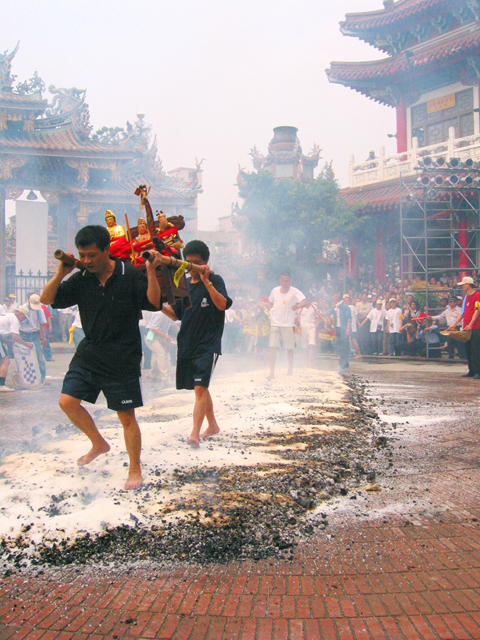Taipei’s Baoan Temple
(保安宮) is probably best known as one of the finest examples of restoration undertaken on an ancient Chinese temple. The decades-long project was initiated by temple director Liao Wu-chih (廖武治) and earned UNESCO’s Asia-Pacific Heritage Award in 2003.
Liao’s vision, however, is not restricted to the dead materials of the past: The Baosheng Cultural Festival (保生文化祭) is one of the many events the temple uses to engage the local community. It’s also an invaluable opportunity to witness Taiwan’s religious culture at its most authentic.

PHOTO IAN BARTHOLOMEW, TAIPEI TIMES
Though the festival officially opened last week and runs until June 28, this weekend sees highlights including parades and performances tomorrow starting at 10am and culminating with the Fire Lion event at 7:30pm. On Sunday, members of the Baoan Temple congregation will demonstrate their devotion in the ancient ceremony of fire-walking (過火), now only rarely practiced in Taiwan. This event is the highlight of the nativity rituals for the Baosheng Emperor, the main deity worshiped at Baoan Temple, who this year is believed to be 1,030 years old.
Starting at 10am tomorrow, the main courtyard of the Baoan Temple will host some of the country’s most highly regarded traditional performance groups, including the Songjiang Formation from Neimen, Kaohsiung County (高雄內門宋江陣), the Flower Drum Formation from Tapu in Yunlin (雲林大部花鼓陣), and the Twelve Grannies Formation from Hsuehchia, Tainan County (學甲十 二婆姐陣). The three groups have played an important part in reviving traditional street performance styles that had been in danger of dying out. To have these groups all in one place, especially so far from home, is a rarity. It also typifies the kind of commitment to ancient art forms for which Baoan Temple has become famous. At 1pm, these groups will join a parade through the Talungtung (大龍峒) and Tataocheng (大稻埕) districts, the heart of old Taipei.
The day’s festivities culminate with the Fire Lion event, in which a fabricated lion stuffed with various types of fireworks is ignited in a spectacular display that typically lasts more than 10 minutes. As with similar events such as Yenshui’s Beehive Firecracker Festival (鹽水蜂炮) and Bombing Handan (炸邯鄲), the purpose of this pyrotechnic display is to drive away evil spirits and pestilence.

PHOTO COURTESY OF BAOAN TEMPLE
Sunday’s rituals begin at 8am when elaborate obeisances to the Baosheng Emperor, who is revered as a god of healing, are conducted. The sacred precincts are closed off to the general public at certain times during these celebrations, but technology allows for viewing of the (to some) mind-numbingly tedious succession of incantations and ritual genuflections by the curious and the faithful. At 1:30pm (approximately, as the preparations are complex), the weekend’s festivities culminate with the fire-walking ritual, when members of the temple community walk over a specially prepared 20m-long strip of white hot coals in the temple’s courtyard. The ancient rite has a visceral intensity rarely seen in sanitized modern religion, whatever one might believe about the scientific or spiritual qualities that make it possible.
Through the end of June, Baoan Temple will also host gezai opera (歌仔戲) and other musical performances. In another revival of tradition, some of these are “competitive” performances, when two or more troupes stage productions at the same time and seek to draw the attention of audience members away from their rivals. The next competitive show is on Monday between 7pm and 9:30pm and pits the Lanyang Opera Troupe (蘭陽戲劇團) against the Yihsin Opera Troupe (一心戲劇團).
These celebratory performances will be followed by more exclusively religious and community-oriented events — local history tours and seminars on traditional street theater — in the following weeks. A detailed list of upcoming activities can be found at the Baoan Temple Web site, www.baoan.org.tw. Baoan Temple is located at 61 Hemi St, Datong Dist, Taipei City (台北市大同區哈密街61號).

Under pressure, President William Lai (賴清德) has enacted his first cabinet reshuffle. Whether it will be enough to staunch the bleeding remains to be seen. Cabinet members in the Executive Yuan almost always end up as sacrificial lambs, especially those appointed early in a president’s term. When presidents are under pressure, the cabinet is reshuffled. This is not unique to any party or president; this is the custom. This is the case in many democracies, especially parliamentary ones. In Taiwan, constitutionally the president presides over the heads of the five branches of government, each of which is confusingly translated as “president”

Sept. 1 to Sept. 7 In 1899, Kozaburo Hirai became the first documented Japanese to wed a Taiwanese under colonial rule. The soldier was partly motivated by the government’s policy of assimilating the Taiwanese population through intermarriage. While his friends and family disapproved and even mocked him, the marriage endured. By 1930, when his story appeared in Tales of Virtuous Deeds in Taiwan, Hirai had settled in his wife’s rural Changhua hometown, farming the land and integrating into local society. Similarly, Aiko Fujii, who married into the prominent Wufeng Lin Family (霧峰林家) in 1927, quickly learned Hoklo (commonly known as Taiwanese) and

The Venice Film Festival kicked off with the world premiere of Paolo Sorrentino’s La Grazia Wednesday night on the Lido. The opening ceremony of the festival also saw Francis Ford Coppola presenting filmmaker Werner Herzog with a lifetime achievement prize. The 82nd edition of the glamorous international film festival is playing host to many Hollywood stars, including George Clooney, Julia Roberts and Dwayne Johnson, and famed auteurs, from Guillermo del Toro to Kathryn Bigelow, who all have films debuting over the next 10 days. The conflict in Gaza has also already been an everpresent topic both outside the festival’s walls, where

The low voter turnout for the referendum on Aug. 23 shows that many Taiwanese are apathetic about nuclear energy, but there are long-term energy stakes involved that the public needs to grasp Taiwan faces an energy trilemma: soaring AI-driven demand, pressure to cut carbon and reliance on fragile fuel imports. But the nuclear referendum on Aug. 23 showed how little this registered with voters, many of whom neither see the long game nor grasp the stakes. Volunteer referendum worker Vivian Chen (陳薇安) put it bluntly: “I’ve seen many people asking what they’re voting for when they arrive to vote. They cast their vote without even doing any research.” Imagine Taiwanese voters invited to a poker table. The bet looked simple — yes or no — yet most never showed. More than two-thirds of those